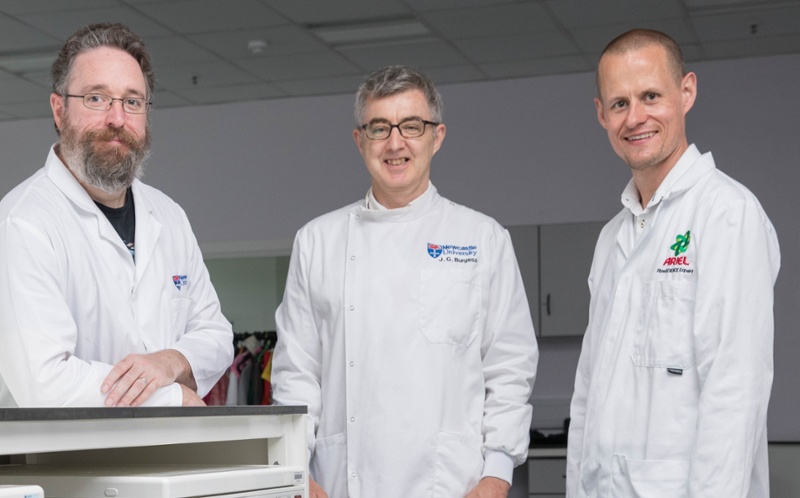Innovative products and saving our environment are part of our strategic partnership
We are proud of our track record of helping businesses to benefit from our world-leading research.
One of our strongest partnerships is with global consumer products giant, Procter & Gamble (P&G).
For more than 60 years, P&G have operated their Newcastle Innovation Centre. It is one of their Fabric and Home Care R&D sites developing major product lines including Ariel and Fairy.
In recent months our partnership has enjoyed several major successes.
Seaweed, slime and socks
Professor Grant Burgess and Dr Michael Hall's work has led to the inclusion of a new enzyme in Ariel laundry detergents.
Professor Burgess explains: “Ships accumulate high levels of slime and other organisms on their hulls and this leads to more resistance, higher fuel consumption and can cause corrosion.
“To combat this, we were keen to understand how marine organisms such as fish, dolphins and seaweed, for example, appear to have solved this fouling problem, as they are good at keeping themselves clean in the sea.
“The key was discovering that some seaweeds are actually covered in bacteria that can release cleaning compounds.
“While bacteria have the capacity to produce powerful adhesives to stick themselves to surfaces, they also produce an “anti-glue” – a phosphodiesterase – that can break up sticky molecules.
“The big surprise was that similar glues are present on dirty clothing where they bind difficult-to-remove body soils and odours to the fabric. This bacterial enzyme can break down these glues, and can therefore be used to keep our clothes clean as well, when introduced to laundry detergents."
Dr Michael Hall adds: “Phosphodiesterases are found everywhere - they are even naturally present on your skin. But what was so exciting about this phosphodiesterase was its resilience. Most enzymes are quite fragile and are damaged by high temperatures, but this one was able to work in both hot and cold temperatures and still be highly effective."
Cold water cleaning
“Improving cleaning in cold water with more environmentally friendly products requires new breakthrough technology,” adds Dr Neil Lant, lead scientist in global enzyme technology at P&G and visiting lecturer at our University.
“We have been able to develop this exciting seaweed based discovery into a new ingredient called Purezyme® in partnership with biotech supplier Novozymes. We’re delighted that the unique new enzyme is now helping our Ariel products achieve even deeper cleaning.”
Machine learning for improving products
The team at the National Innovation Centre for Data worked with P&G to create new predictive systems for capturing and processing customer insights. They helped them to better understand skills needed to develop such systems in-house.
Ditch the delicate wash cycle to reduce plastics in the environment
Our research has shown that it is the volume of water used during the wash cycle, rather than the spinning action of the washing machine, which is the key factor in the release of plastic microfibres from clothes.
Working with P&G we measured the release of plastic microfibres from polyester clothing for a range of cycles and water volumes.
Millions of plastic microfibres are shed every time we wash clothes that contain materials such as nylon, polyester and acrylic. Because these fibres are so small, they drain out of our washing machines and can ultimately enter the marine environment.
Counting the fibres released, the team found the higher the volume of water the more fibres released, regardless of the speed and abrasive forces of the washing machine.
800,000 more fibres were released in a delicate wash than a standard cycle.
Related links and articles
- National Innovation Centre for Data
- Case studies of our work with business
- Our engagement and place strategy
- Our other corporate partnerships:

